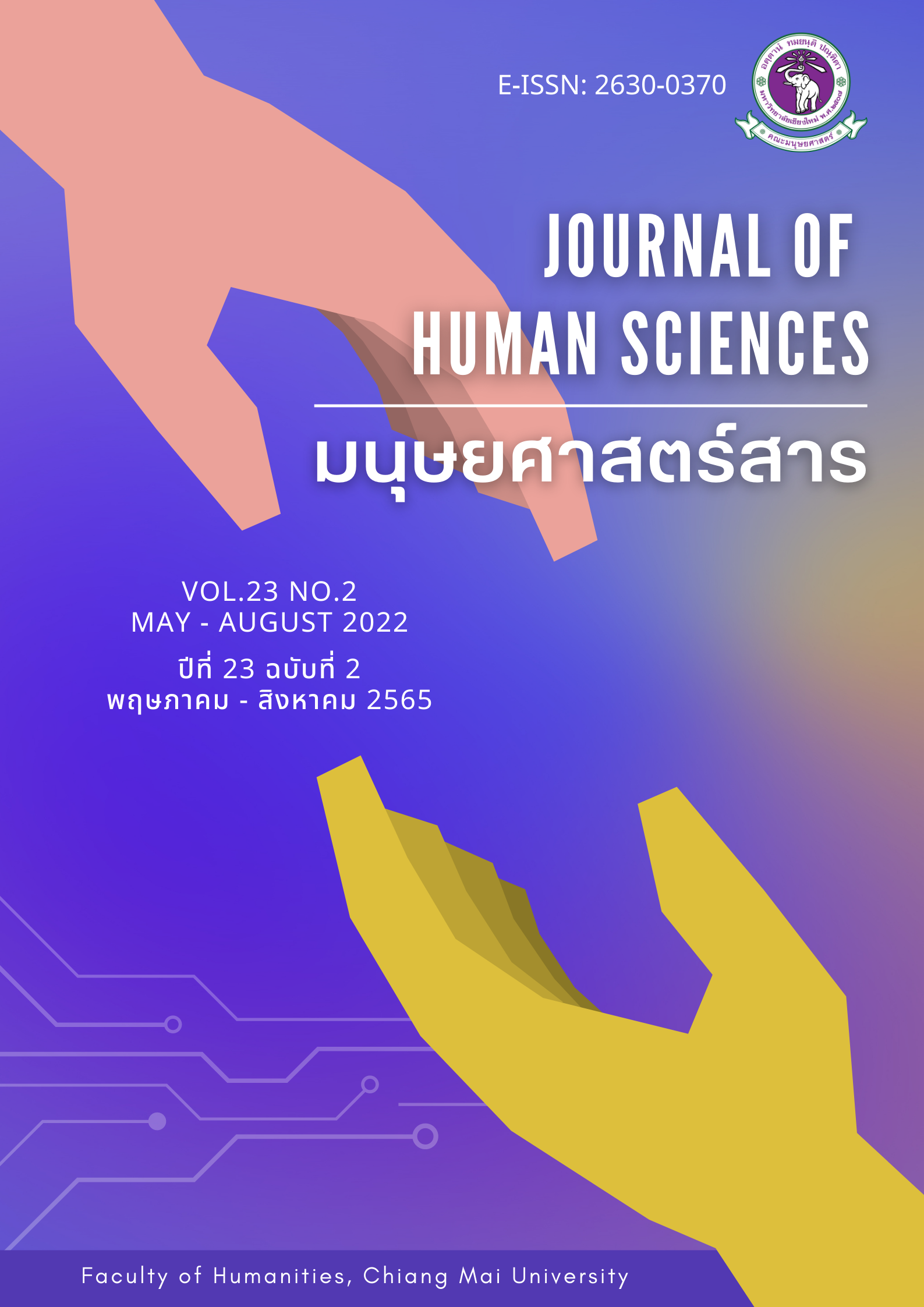กลวิธีการดัดแปลงตัวละครนวนิยายเรื่องซั่งอิ่น 上瘾 Addiction สู่ละครออนไลน์เรื่องซั่งอิ่น 上瘾 Addiction
Main Article Content
บทคัดย่อ
งานวิจัยฉบับนี้มีวัตถุประสงค์เพื่อศึกษากลวิธีการดัดแปลงและปัจจัยในการดัดแปลงตัวละครจากนวนิยายเรื่องซั่งอิ่น上瘾 Addiction สู่ละครออนไลน์เรื่องซั่งอิ่น上瘾 Addiction โดยใช้วิธีการศึกษาวิเคราะห์และเปรียบเทียบระหว่างตัวละครในนวนิยายเรื่องซั่งอิ่น上瘾 addiction เล่ม 1 กับตัวละครในเวอร์ชันละครออนไลน์เรื่องซั่งอิ่น上瘾 Addiction จากแพลตฟอร์มวีทีวี (WeTV) ผลการศึกษาพบว่ากลวิธีการดัดแปลงตัวละครจากนวนิยายสู่ละครออนไลน์ ประกอบด้วย กลวิธีการดัดแปลงประเภทการคงเดิมในตัวละครเอกจำนวน 4 ตัวละคร และไม่พบกลวิธีการดัดแปลงอื่นในประเภทตัวละครเอก นอกจากนี้ยังพบกลวิธีการดัดแปลงประเภทการคงเดิมในตัวละครประกอบจำนวน 13 ตัวละคร ประเภทการดัดแปลงในตัวละครประกอบจำนวน 2 ตัวละคร และประเภทการตัดทอนในตัวละครประกอบ จำนวน 5 ตัวละคร และผลการศึกษายังพบว่าปัจจัยที่ส่งผลต่อการดัดแปลงตัวละครคือ ปัจจัยด้านฉากและปัจจัยด้านบทบาทของตัวละคร
Article Details

อนุญาตภายใต้เงื่อนไข Creative Commons Attribution-NonCommercial-NoDerivatives 4.0 International License.
เอกสารอ้างอิง
Chai Jidan. (2016). Shangyin lem1 [Addiction vol.1]. Taipei: China Times.
Ge, J. (2018). Woguo wangluo ju zhong tongxinglian qnuti xingxiang chengxian fenxi [Analysis
of the image presentation of homosexual groups in Chinese online dramas] (Master of
Journalism thesis, Nanjing Normal University).
Hutcheon, L. (2006). Thritsadi kan datplaeng [A theory of adaptation]. Abingdon-on-Thames:
Routladge company.
Kaewthep, K. (2010). Neao phinit mai nai su kansuksa [New perspectives in educational
media]. Bangkok: Parbpim.
Kraivimol, S. (2002). Laksana khong bot lakhon thorathat Thai thi dai rap Khemasiri niyom
chuang lang khao chak pi phoso 2535 thung phoso 2544 [Characteristic of popular
prime time Thai television drama script during 1992-2001] (Master of Communication
arts thesis, Chulalongkorn University).
Manopanon, S. (2016). Konyut buk talat phapphayon chin [Strategy to penetrate the Chinese
film market]. Retrieved from https://thaibizchina.com/
Mearnjan, N. (2020). Kansuksa priapthiap lakhon thorathat Raksaisai huachai siduang
woechan Taiwan 2001 woechan chin phaendinyai 2009 lae woechan chin phaendinyai
[A Comparative Study about Three Versions of “Meteor Garden” Series by
Taiwanese Versions in 2001 and Chinese Versions in 2009 and 2018] (Master of arts
thesis, Kasetsart University).
Nukulkit, S. (2000). Wannakam Thai nai patchuban [Current Thai literature]. Bangkok:
Srinakharinwirot university Bangkhen.
Sangchai, J. (2017). Kan datplaeng nawaniyai chut pha khong Phongsakon pen bot
lakhonthorathat [The adaptation of Pongsakorn’s novel series “clothes” into TV series]
(Master of communication arts thesis, University of the Thai Chamber of Commerce).
Sangchai, N. (2009). Bot lakhon Thai: krabuankan sangsan lae theknik [Tahai Tv drama script
writing: creation process and techniques] (Master of communication arts thesis,
University of the Thai Chamber of Commerce).
Sutheepattarakool, K. (2020). Kanprakob sang tualakhon chai rak chai nai siriwai [Construction
of gay characters inThai boy love series] (Master of Arts and Innovation thesis,National Institute of Development Administration).
The Secretariat of the Prime Minister. (2000). Ken kan thotsiang phase chinmaendarin duai
akkharawithi Thai [Mandarin Chinese transcription criteria with Thai alphabet].
Pathumthani: Thammasat printinghouse.
Waewhong, N. (2007). Parithat sinlapa kan lakhon [Introduction to dramatic arts]. Bangkok:
Chulalongkorn University Press.
Yang, Y. (2017). Shi lun wangluo zizhi ju dui nuxing de yinghe yi Taizi fei sheng zhi ji Shangyin
Congcong na nian Wei li [On the catering of women by online self-made dramas, taking
"Go princes go", "Addiction" and "The Fleeting year" as examples] (Master of
Radio television arts thesis, Nanjing University of the Arts).


